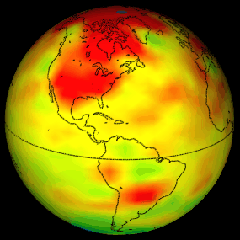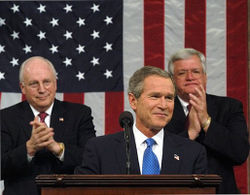
"Global warming is an unproven theory."
"Trying to stop it will cost the economy dearly and accomplish nothing."
"It is being promoted by environmentalists as a cynical ploy to raise money."
"Trying to stop it will cost the economy dearly and accomplish nothing."
"It is being promoted by environmentalists as a cynical ploy to raise money."
Many North American media outlets continue to supply the public with such a steady diet of such misinformation and skewed science on the critical issue of global warming that it might be best described as “journalistic malpractice”.
Hyperbole? Hardly.
Consider this thought experiment: Would it be ethical for a news editor in 2007 to publish an opinion piece by a tobacco industry funded “expert”, long inactive within the scientific community, stating that there is no proven link between tobacco and cancer?
Such journalistic mischief went on for many years, clouding the public debate and no doubt costing many lives. However the days when such “balanced reporting” would be considered acceptable have long past.
Even Exxonmobil, which funded the climate-change deniers for years, finally admitted this month that global warming is real -- even though it has been obvious to the scientific community for many years that humans were contributing to the problem through emissions of greenhouse gases.
Yet many papers like the National Post and Los Angeles Times repeatedly published articles by such deniers as Patrick Michaels, and S. Fred Singer – who some might remember from his previous efforts to ally public fears about the dangers of ozone depletion and second hand smoke.
And then there is the curious case of Dr. Tim Ball. He is a long retired professor from the University of Winnipeg and a well-known climate change denier who has not published a peer-reviewed scientific publication on climatology in over a decade.
That not to say that Dr. Ball hasn’t been busy writing lately. Over the last five years he has published no less than thirty-nine opinion pieces, and thirty-two letters to the editor in twenty-four Canadian newspapers. Fifty of these pieces ran in papers owned by Canwest Global. These efforts totaled an incredible 44,500 words. As a freelance writer myself, I am in awe at Dr. Ball’s success in placing his writing in the nation’s papers.
This is even more surprising given the monotony of his material. Virtually all of these articles were variations on a single theme: that science does not support that global warming is caused by humans. In the byline of every opinion piece, he was characterized as an expert on climatology. What is the public to think?
Among his unorthodox views, published as recently as last month in Calgary Sun:
- Global temperatures have declined since 1998 in direct contradiction to computer models on which Kyoto is based.
- Ice core records show temperature rises before CO2 rises, not as a result of it.
- Evidence mounts that pre-industrial levels of CO2 may have been much higher than the 280 ppm assumed by environmentalists.
- New research shows changes in output of the sun accounts for most of the recent warming and cooling of our planet.
- The primary evidence of human influence on climate, the "hockey stick" temperature graph of Michael Mann, has been debunked as manipulated and wrong.
A basic tenet of journalism is fact checking. Do these surprising claims have any scientific basis?
I phoned up Dr. Richard Gammon, Professor of Oceanography and Atmospheric Sciences at the University of Washington to ask. Somewhat exasperated, he refuted all of these points as either scientifically baseless or grossly misleading.
Strange.
I then called Dr. Andrew Weaver, a leading Canadian researcher in the field of climate science who holds a Canada Research Chair in Climate Modeling in Analysis at the University of Victoria.
He is also the chief editor of “Journal of Climate” – the leading academic publication in this field, and a lead author with the Intergovernmental Panel on Climate Change. This is the largest peer review exercise in the history of science, involving 2000 climate researchers from 100 countries.
Weaver also quickly confirmed that Ball’s well-published assertions have no scientific basis.
What’s going on? Do newspaper editors not possess a phone? How can it be that Dr. Ball managed to publish all those articles stating more of less the same thing if what he is saying lacks scientific merit?
First let’s start with the basics. Here is what Gammon had to say about Tim Ball’s doubts that there is no link between humans and climate change.
 “This is like asking ‘is the moon round?’ or ‘does smoking cause cancer? We’re at a point now where there is no responsible position stating that humans are not responsible for climate change. That is just not where the science is…for a long time, for at least five years and probably ten years, in the international scientific community has been very clear”
“This is like asking ‘is the moon round?’ or ‘does smoking cause cancer? We’re at a point now where there is no responsible position stating that humans are not responsible for climate change. That is just not where the science is…for a long time, for at least five years and probably ten years, in the international scientific community has been very clear”In case there is any doubt, Gammon goes on. “This is not the balance of evidence argument for a civil lawsuit, this is the criminal standard beyond a reasonable doubt. We’ve been there for a long time and I think the media has really not presented that to the public.”
How does Gammon explain many of the climate science holdouts? “You can always find somebody paid for by the Western Fuels Association or Exxon Mobil to stir the pot and say that we don’t know yet or we are still confused and we need to listen to all sides and ExxonMobil will take that point of view.”
The role of the media in shaping the so-called climate debate is much larger however than merely providing space to industry actors claiming scientific credibility. Consider the editorial positions of many of the major newspapers in North America.
From the Los Angles Times last year: “Major news media have gone after scientists who argue there's still time to study global warming rather than plunge into some half-baked environmental jihad that could waste possibly trillions of dollars.”
Vancouver Sun business columnist Michael Campbell regularly holds forth on climate change. Last year he scolded the scientific community for their slapdash work:
“I see little evidence that proponents of man-made global warming know how damaging the shoddy science behind some of their claims has been to their cause. They don't seem to understand that for many of us, global warming is not an article of faith, but rather of science. And when the science is faulty, it damages the credibility of their cause.”
We can only assume that Mr. Campbell is referring to those dullards at the Intergovernmental Panel on Climate Change. Their 2001 assessment report stated “There is new and stronger evidence that most of the warming observed over the last 50 years is attributable to human activities” .
Perhaps he was referring to the Academies of Sciences of 11 countries including the US and UK, who released a joint statement in 2005 stating that, "the scientific understanding of climate change is now sufficiently clear to justify nations taking prompt action.”
By the way, Mr. Campbell’s academic training is in economics.
In his polysyllabic fashion, Rex Murphy also hectored the nation on the issue of climate science last month in his column in the Globe and Mail: “It is emphatically time for the most scrupulous and disinterested inquiry to determine the solid core of what is really known about the subject, separated from the great clouds of speculation, advocacy, geopolitics and calculated alarmism that overhang and shadow that core.”
It is as if these opinion writers and the scientific community exist on separate planets. Has the media never heard of the numerous, if pedantic, ways that the world’s scientific community has been trying to warn the world about global warming? When does it become unethical for the media to be used as a PR tool by a powerful corporate sector to delay meaningful regulation?
That was the question asked by the Union of Concerned Scientists (UCS) in a report released this month called “Smoke, Mirrors & Hot Air: How ExxonMobil Uses Big Tobacco's Tactics to "Manufacture Uncertainty" on Climate Change”
This report draws the obvious parallel to the infamous and highly successful PR campaign by the tobacco industry to sow seeds of doubt in the minds of the public about the link between smoking and cancer.
 Like oil companies today, Big Tobacco faced costly regulation due mounting scientific evidence of the dangers of their product. However they had a problem. They knew that almost no one would believe them if they tried to tell the public themselves that cigarettes were safe.
Like oil companies today, Big Tobacco faced costly regulation due mounting scientific evidence of the dangers of their product. However they had a problem. They knew that almost no one would believe them if they tried to tell the public themselves that cigarettes were safe.Their solution? Tobacco companies realized that they must instead fund phony scientists to speak on their behalf. These “skeptics” had two important advantages over real scientists.
First, they didn’t have to bother defending their positions in the scientific community because scientists weren’t the audience of this campaign, the public was. Like a washed up boxer who now only picks fights in bars, these skeptics, many of whom have impressive sounding credentials, restrict their pugilisms to the popular press rather than the peer reviewed scientific journals.
On this footing, it is a rather unfair fight. The rules of engagement in the media are very different than in the scientific community. The mastery of the sound bite rather than possessing robust data and an elegant question almost always carries the day in the media minute. The notoriously bad communication skills of some active researchers do not help matters.
The second advantage is that “skeptics” do not have to win the public debate, only cloud public opinion so as to delay regulation.
A now famous internal memo from the Brown & Williamson tobacco company put it bluntly: “Doubt is our product, since it is the best means of competing with the ‘body of fact’ that exists in the minds of the general public. It is also the means of establishing a controversy.”
Compare this with a memo from the American Petroleum Institute in 1998 calling for a “campaign to recruit a cadre of scientists who share the industry’s views of climate science and to train them in public relations so they can help convince journalists, politicians and the public that the risk of global warming is too uncertain to justify.”
What was old is new again. Remarkably, this chilling plan by Big Oil to use the media to deceive the public was largely ignored by news outlets when it became public.
According to the USC report, Exxon Mobil “funneled nearly $16 million between 1998 and 2005 to a network of 43 advocacy organizations that seek to confuse the public on global warming science”
If there is a significant difference between the PR efforts of the tobacco industry and fossil fuel sector, it is size. The oil, gas and coal sectors make Big Tobacco seem positively puny by comparison.
The fossil fuel industry is the largest industrial sector the world has ever known, currently worth $8 to 9 trillion annually. This is four to five times larger than the next largest industrial sector . By this yardstick, the amount of money invested in funding climate change deniers is pocket change to Big Oil.
The oil industry is also refreshingly frank about where they put their dollars. In their own words, “ExxonMobil is committed to supporting organizations that…promote informed discussion on issues of direct relevance to business and the company’s ongoing operations."
Has this campaign against climate science been successful? You bet. It may well go down as the most audacious, successful and cynical campaign in public relations history.
Consider a recent paper entitled “Balance as bias: global warming and the US prestige press”, published in 2004 on the very subject of how climate change science is distorted by the media. The authors analyzed media stories from the five most prestigious newspapers in the US, including the New York Times, Washington Post and Wall Street Journal over a five-year period to see what relative weight was being given to mainstream (i.e real) scientists and so-called “skeptics”.
“From a total of 3,543 articles, we examined a random sample of 636 articles. Our results showed that the majority of these stories were, in fact, structured on the journalistic norm of balanced reporting, giving the impression that the scientific community was embroiled in a rip-roaring debate on whether or not humans were contributing to global warming.”
The report found that the “US prestige-press coverage of global warming from 1988 to 2002 has contributed to a significant divergence of popular discourse from scientific discourse…that the prestige press’s adherence to balance actually leads to biased coverage of both anthropogenic contributions to global warming and resultant action.”
In plain English this translates as: the public is being misinformed on climate science by a poor journalism that continues to tell both sides of the story, even when there is no other side. The resultant political inaction might well kill the planet.
Returning to our original question, is it then ethical for an editor to provide space to industry-funded spokespeople claiming scientific credibility they don’t have?
“In my opinion, that is where ethical problem lies”, says Eric Jandciu, Research Coordinator at the UBC School of Journalism. “You are in effect proving misinformation to the public because there is no more [scientific] debate on this and we seem to be very far behind in Canada and the US. In the European media for years now they have stopped with this debate.”
While it must be tempting for editors to run material that runs counter to conventional beliefs, is there something else going on? For instance, could major sponsors be affecting editorial content?
According to the Canadian Newspaper Association of the top 30 advertisers in Canadian papers, 15 are from the auto industry. Car ads represent fully 54% of those revenues – totaling $549 million to Canadian newspaper publishers each year from the top 30 alone.
But what does money have to do with anything?
Considering the enormous consequences of continued inaction on climate change this shoddy journalism is not only unfortunate, it is irresponsible in the extreme.
Has this systematically inaccurate coverage influenced public opinion? Of course. That’s the whole point. Consider these public opinion numbers.
A poll from the fall of last year showed that fully 50% of Canadians still believed that “most scientists disagreed with each about whether global warming was happening”. In the US, the numbers are even worse. An ABC news poll last year showed that 64% of Americans believed the majority of scientists are still arguing whether global warming was even happening.
Which brings us the crux of the matter. How important is public opinion for influencing politics? Perhaps mark Twain said it best;
“Its name is Public Opinion. It is held in reverence. It settles everything. Some think it is the voice of God.”
I asked Former Environment Minister David Anderson about the limitations that public opinion can place on policy makers, and how the oil sector influenced climate coverage while he was Minister. Did skewed coverage on climate science make his job as Minister more difficult?
“Of course”, said Anderson. “There was a very professional group of people who managed to get a large number of articles and letters to the editors [from climate skeptics] into Canadian media – they worked hard at it”, says Anderson.
“If you look at the columnists in Canada, you will find a very surprising interest in the views of dissenters. Just about every columnist in the Globe and the Vancouver Sun recites this intellectually pre-prepared stuff on climate science. Where does it come from? In Canada there has been a successful campaign to get the views of the deniers into the media, and it has been enormously successful. It has been very secretive and someone has been funding it…”
Why did Big Oil care about so much about little old Canada? Anderson is blunt:
“Bush said restrictions on greenhouse gases will destroy the US economy.”
 Therefore the US based oil companies “never wanted a North American economy - Canada, close to the US in every respect –to succeed and prove him wrong. We were quite important to the American campaign. We succeed, and Bush looks as incorrect on climate and the effect on the American economy, as he is looking on Iraq.”
Therefore the US based oil companies “never wanted a North American economy - Canada, close to the US in every respect –to succeed and prove him wrong. We were quite important to the American campaign. We succeed, and Bush looks as incorrect on climate and the effect on the American economy, as he is looking on Iraq.”“They did not want Canada to succeed [in creating a green economy] because they knew that it wasn’t that hard. They knew the loss, especially in a growth economy such as ours, would be essentially imperceptible. No calculation suggested that this was going to be a severe dislocation to the Canadian economy.”
So what then is Anderson’s explanation for the Liberals lack of greater progress on climate policy? “You had the official opposition against you, had the provinces against you, you had business against you…” and lastly “you had a coherent campaign in the media against you.”
Anderson believes Canadian editors “were consistently getting under their noses the results of a sophisticated campaign of communications,” and that newspaper columnists “repeat some things in language and format which is so consistent across the board that it can only come from one source... that’s the people to whom the communications experts were focusing on. They focused on media.”
That campaign didn’t make Anderson’s job any easier. While the liberals record on reducing greenhouse gases was admittedly abysmal, so was the public understanding of the issue. In 1999, when Anderson became environment minister, only 2% of Canadians believed global warming was the most important environmental issue.
The political importance of keeping the public confused about climate science was made clear in a remarkable memo by Whitehouse spin-doctor Frank Luntz to the Bush administration in 2003:
“The debate is closing (against us) but is not yet closed. There is still a window or opportunity to challenge the science… should the public come to believe the scientific issues are settled, their views about global warming will change accordingly. Therefore, you need to continue to make the lack of scientific certainty a primary issue in the debate…”
Perhaps the most compelling evidence that the North American public has been grossly misled by our news media comes this month from the biggest oil company of them all, ExxonMobil.
While Tim Ball and Michael Campbell seem utterly steadfast for the need for greater scientific debate and research, Exxon seems now not so sure.
This month the world’s largest oil company executed a stunning flip flop on global warming. Kenneth Cohen, Exxon's vice president for public affairs, acknowledged that "we know enough now -- or, society knows enough now -- that the risk is serious and action should be taken.”
They also took the opportunity to publicly announce that they were cutting support to such notorious climate change deniers as the Competitive Enterprise Institute, and “five or six” other groups active in the so-called climate science debate. According to Cohen, "The issue has evolved.”
That is not to say that much precious time has not been wasted, but this development will hopefully begin to shift the public debate from arguing science to debating policy.
Weaver agrees. “Debating the science is good but it doesn’t happen in the opinion editorial pages of newspapers, it happens in the scientific community”. At the same time he feels “debating the policy [of global warming] is crucial and that is what has to happen in public discourse”
Gammon thinks that media coverage is improving but has a long way to go. “It’s beginning to move to where we need to be but not nearly fast enough. In my mind people are not scared enough. It’s a funny issue because the scientists are more worried about it than the general public.”
“You just can’t give up though because these guys [climate deniers] don’t give up. As long as they can plant the seed in the public mind that this is all controversial, they’ve won. That’s all they have to do. We need to keep strengthening the science and saying it as clearly as possible and working with the media so that the media gets the right message out.
Personally I believe Gammon is being far too charitable. I find it hard to believe that media professionals - typically superb at research and fact checking - have simply not yet figured out that science resolved this debate five to ten years ago.
 How much is a stake here? Do scientists like Weaver think dealing with global warming is urgent? “Incredibly urgent. On a scale of one to ten, how about ten? I don’t worry so much for me as a Canadian; I worry about the global instability that will result from it. An example I give is “ what are we going to do about 100 million people that are displaced from Bangladesh this century?”
How much is a stake here? Do scientists like Weaver think dealing with global warming is urgent? “Incredibly urgent. On a scale of one to ten, how about ten? I don’t worry so much for me as a Canadian; I worry about the global instability that will result from it. An example I give is “ what are we going to do about 100 million people that are displaced from Bangladesh this century?”The possibility of tipping points are particularly troubling to Weaver. “Permafrost in the northern hemisphere is a massive reservoir of carbon...If you look at the last time there were massive methane releases [that would result from melting permafrost], 94 percent of species of life on the planet died. If we don’t have this baby turned around by 2030, it’s game over for an awful lot of people.”
What about the assertion that we need more research before we can act? Weaver bristles. “What bugs me most is that I have been criticized that the only reason I am doing this is that I want more research money. The irony is that [scientists] are saying we don’t need more research. What we need is action…we know what’s going on. We know what needs to be done. The thing that would get me more research money would be to say ‘yeah, there’s a lot of uncertainty and I really think before we do policy, we need to spend some money to figure this thing out’”. That would be the purely selfish thing to say but that has not been the response from the [scientific] community.”
He also offers this advice to the media: “ What newspaper editors have to realize is that there are people out there who are using them. People don’t liked being used but they have to realize that they are being used… Rather than thinking that they are serving the public discourse, ask the question ‘am I being used to further an agenda?’ And the answer with the issue of climate change is yes.”
There is a certain irony in a career scientist like Weaver seeing so clearly what is wrong with how the media covers climate change, when he has had to endure so many media commentators publicly lecturing him on science.
Lastly, there has been a fascinating twist to the Tim Ball story. In April of last year, one of his op-eds in the Calgary Herald slamming the science of climate change raised the ire of a real scientist, Dr. Dan Johnston at the University of Lethbridge.
Johnston wrote a letter to the editor questioning the qualifications and academic credentials of Dr. Ball, and was quickly sued for defamation (no irony there). Ball filed a suit against not only Johnston, but the editors of the Calgary Herald for $325,000 for among other things “damages to his income earning capacity as a sought after speaker with respect to global warming”
The court documents filed by the Herald in their defence are illuminating. They state that Ball “is a member of the Friends of Science, a group dedicated to discrediting mainstream scientific beliefs and theories regarding the contribution of human sourced greenhouse gases to global warming” and that “the Friends of Science and the plaintiff are, at least in part, supported and funded by members of the oil and gas industry who have a vested interest in limiting the impact of the Kyoto accord on their business.”
The Herald also stated that Ball has published few articles in academically recognized peer-reviewed scientific journals”, and that he “has not conducted research regarding the relationship between climate and elements within the atmosphere.”
Lastly, here is how editors of the Herald characterized the credibility of a man whose opinion pieces on climate change they had chosen to publish eight times in the last five years: “the plaintiff is viewed as a paid promoter of the agenda of the oil and gas industry rather than as a practicing scientist”.
Strange. This was not how he was identified in his bylines. In his op-ed of April of last year, the Herald cited him as “a Victoria-based environmental consultant. He was the first climatology PhD in Canada and worked as a professor of climatology at the University of Winnipeg for 28 years.”
Therein lies the heart of the matter. This is not about freedom of speech. No one is suggesting that papers should not have the freedom to publish whatever and whomever they want, as long as it is not violating any laws.
The question instead is one of properly identify their sources – a basic tenet of good journalism.
Imagine if the next time Dr. Ball was cited in the popular press he was instead identified as “a paid promoter of the agenda of the oil and gas industry rather than as a practicing scientist”, as the editors of the Calgary Herald stated in their sworn statement to the court.
That might better arm the reading public to draw their own conclusions, both about his provocative comments, as well as the wisdom of the news outlet in publishing them.
Not much chance of that it seems. Incredibly, Tim Ball’s controversial op-eds have been published an additional eight times in Canwest papers since Ball sued the editors of the Calgary Herald on September 1, 2006. In all of those cases, Ball was cited as a former professor at the University of Winnipeg.
What if we demanded more from our media on what is emerging as the leading issue of the 21st century. What if the mainstream media stopped being a big part of the problem, and became part of the solution?
Does it seem strange for instance, that while the environment is the number one issue of concern for Canadians, that the Globe and Mail or the Vancouver Sun have no one writing a regular column on the environment? Arguably, both these papers already have several commentators that regularly spill buckets of ink questioning our movement towards a greener world. A bit of balance would be nice.
Or how about our venerable CBC?
Radio One has dedicated programs for business, sports, advertising, science, Quebec culture, pop culture, food, story telling, spirituality, comedy, and theatre. There are three separate shows on writing and books, and fully eleven programs on music. CBC’s television networks include stand-alone programs on fashion, hairstyles, gardening, antiques and even fly-fishing.
Amid this dizzying Can-Con diversity, however, there is one glaring omission. At present, there is no dedicated CBC radio or television program on the number one issue of concern to Canadians: The environment.
If any of these editors and producers need a writer, I’m available.
Mitchell Anderson is a freelance writer. This piece ran in the Georgia Straight on January 25, 2007
No comments:
Post a Comment